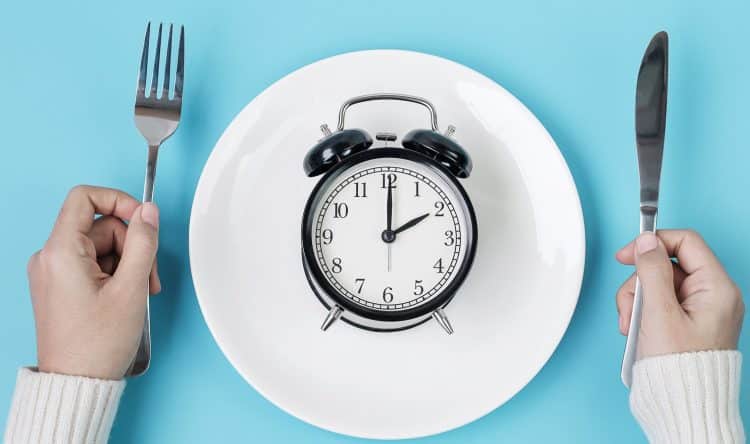Fasting has been an essential part of human life for thousands of years. In modern times of no scarcity, overeating has become the primary cause of obesity, leading to several health-related issues like type 2 diabetes and cardiovascular diseases.
In recent times, more and more health care professionals and scientists are suggesting fasting or time-restricted eating as a tool to tackle health hazards like obesity, heart-related ailments, diabetes, aging, etc. [1]
Further in this article, we will learn about fasting, notably extended fasting methods (48-hour and 72-hour), their advantages, their effect on the body, and who can benefit from them. We will also discuss several tips to follow extended fasting programs safely.
How Does The Body Respond to a Fast?
To better understand what happens when you fast, we must first understand what happens when you eat food.

When we eat food, the insulin levels in our body spike as it is the primary hormone responsible for storing and burning food energy. Insulin signals the body to start using the food as energy immediately.
But what happens if we consume more food than the body requires? The excess energy is stored in the liver in the form of glycogen. However, the liver can only hold a finite amount of glycogen. In this case, the body starts storing the excess glucose as fat.
During fasting, the insulin levels in our body fall, which signals the body to burn stored energy. Now, the primary energy reserve of the body is the glycogen stored in the liver. Once the stored glycogen is depleted, the body is forced to break down the stored fat for energy. This process is called “ketosis.”
Extended fasting practices (48 or 72-hour) are a great way to force the body to enter ketosis voluntarily and break down the stored fat, leading to weight loss. Notably, ketosis is a normal process that occurs regularly in the human body.
Prolonged Fasting Regimes: 48-Hour and 72-Hour Fasting
Prolonged fasting involves fasting for more than 24 hours. It is also known as water-only fasting. Still, people who practice prolonged fasting can drink zero-calorie drinks like water, tea, and coffee without sugar, creamer, or milk.
Prolonged fasting has the same health benefits as regular fasting. However, some additional advantages include higher cognition and brain function. Fasting for 48 or 72 hours also encourages autophagy, a process by which the body gets rid of weak and old cells and promotes cell regeneration.
We must first evaluate what happens in our body throughout the various prolonged fasting methods, such as 48-hour and 72-hour, to understand which extended fasting plan is better for us in the long run.
What Happens in The Body During a 42-Hour Fast?
The body’s insulin levels are significantly high during the initial 12 hours of a fast. So, it breaks down the food in the digestive system to produce energy. The excess energy is stored as glycogen in the liver. The body regularly uses the stored glycogen in the liver during the initial 12 hours of the fast to perform certain necessary tasks.
Most of the stored glycogen in the liver is depleted during the next six hours, and the body is forced to find other alternatives for energy production. The triglycerides in the different fat stores of the body are further broken down to produce energy. During this period, the body is forced into the initial stages of ketosis, and the fat stores are targeted for further energy production. [2]
When the fasting duration reaches the 24 to 48-hour mark, ketosis is in full swing, and the body, during this time, is only using the fat reserves to produce energy. Another phenomenon that starts taking place during this period is cellular autophagy. [3]
“Auto” means self, and “phage” means to eat. So essentially, the body starts eliminating the weak and old cells. Additionally, the body removes toxins and cleanses the cells.
During the latter part of a 48-hour fast, the body starts experiencing vigorous autophagy. Additionally, muscle and tissue repair occurs since the body secretes growth hormones during this stage. Some people might start feeling less hungry during this stage.

What Happens in The Body During a 72-Hour Fast?
Once the 48-hour mark is breached, the body is in complete ketosis since it has expended all its energy resources and the stored fat resources are the only energy reserve for the body. The autophagy process also continues during this period. [4]
Although growth hormone secretion starts during the 48-hour fasting period, during the 72-hour fast, the repair process is much more pronounced and active. New white blood cells are produced during this period, boosting the body’s immunity. The body’s insulin sensitivity also significantly increases, so the cells absorb the blood glucose better.
Studies have shown that during a 72-hour fast, brain function improves, which can prevent Alzheimer’s and Parkinson’s disease. [5]
48-Hour vs. 72-Hour Fast
There is not much difference in the benefits of a 48 and 72-hour fast. During both fasting practices, the body reaches ketosis, breaking fat down to produce energy. Some forms of cellular autophagy also occur, leading to the body eliminating toxins and old cells.
The only difference that can be seen during these types of fasting practices is that of the secretion of growth hormone. Because of this growth hormone (HGH) secretion, the body undergoes a lot of tissue repair during the 72-hour fasting period.
Now that we have pointed out the benefits of the different prolonged fasting programs, let’s discuss which is better.
The answer isn’t that simple because prolonged fasting is challenging and requires a lot of self-discipline to do regularly. If you are new to fasting, it is best to start with a 16-hour, 24-hour, or alternate-day fasting plan. It is a great way to get into the habit of fasting and eventually build up the self-discipline to safely perform a 48 or 72-hour fast.
Risks Related To 48-Hour and 72-Hour Fasting
Since we have discussed all the health benefits of prolonged fasting, we must address its essential risks.
People with comorbidities like heart disease, diabetes, kidney disease, or respiratory complications should always consult their doctor before starting prolonged fasts.
People with eating disorders or who are generally underweight must avoid these fasting practices since they can severely affect their health. Prolonged fasting can lead to headaches, abdominal pain, extreme hunger, and fatigue. Hence, people should know these side effects before opting for prolonged fasts [6].

Tips for Prolonged Fasting
As previously mentioned, it is preferable to practice 16 or 24-hour fasts to develop the tolerance to practice prolonged water-only fasts safely.
The following tips can help you get through the fasting period once you’re prepared to try these prolonged fasts:
- Hydrate: During a prolonged fasting period, proper hydration is a must. It helps prevent many known side effects of fasting. [7]
- Stay busy: Keep yourself busy during a fast to stay away from hunger pangs.
- Mix it up: Coffee and tea are great fasting beverages since they are mild appetite suppressants, which can aid the fasting process.
- Nutrition: Follow a nutritious diet on your non-fasting days.
- Break the fast slowly: During a prolonged fast, our body is deprived of any form of food. It is essential to slowly re-introduce food once the fasting period is over. Eating spicy or fat-rich foods to break the fast can lead to an upset stomach or diarrhea.
- Listen to your body: Fasting has no set rules. We should listen to our bodies while fasting. A comfortable 50-hour fast is much better than a very uncomfortable 72-hour fast. Fasting can be difficult but not unpleasant; you can always stop if under stress or discomfort.
Benefits of Fasting in General
Fasting has a host of health-related benefits associated with it. Some of them are as follows:
1. Weight Loss
Weight loss is one of the most prominent benefits of fasting as it forces the body to break down stored fat. Also, fasting regularly can boost your metabolism, which aids in weight loss. [8]

2. Preventing Diabetes
Intermittent fasting or alternate-day fasting may lead to decreased insulin resistance, increasing the body’s insulin sensitivity and leading to the more efficient transport of glucose from the bloodstream to the cells [9].
3. Autophagy
Several studies point out that extended fasting practices lead to autophagy, where the body consumes old, weak cells and replaces them with newer, healthier cells.
4. Better Heart Health
Health experts believe that fasting regularly leads to better heart health, as studies suggest that fasting reduces levels of bad LDL cholesterol. LDL-cholesterol is the root cause of diseases like atherosclerosis. Additionally, studies have found that fasting dramatically reduces harmful blood triglycerides. [10]
5. Delayed Ageing
Although there is not enough evidence, several animal-related studies show that fasting can lead to increased lifespan and better cell health. [11]
6. Fights Inflammation
Studies show that fasting regularly can reduce inflammation markers, which leads to better overall health. Some studies also find that fasting can be beneficial in treating sclerosis. [12]
7. Boosts Brain Function
Several preliminary animal studies reveal that intermittent fasting can lead to better brain activity and health. Also, according to some studies, fasting can prevent cognitive diseases. However, more research is needed in this regard. [13]
8. May Reduce Cancer Growth
According to several test tube-based lab studies, fasting can help the chemotherapy process on cancerous cells, resulting in a delay in tumor growth. [14]
Frequently Asked Questions
1. Will my metabolism slow down while fasting?
No, fasting does not cause your metabolism to slow down. Several studies have busted this age-old myth.
2. Can I exercise in a fasted state?
Generally, it is okay to exercise while fasting since the body will mostly burn the stored fat to produce energy. Although it is essential to point out that some high-intensity exercises like marathons and ironman workouts should be avoided while fasting. [15]
3. Will fasting make me feel tired?
On the contrary, people tend to feel energized while in a fasted state. It may be because of the adrenaline produced during a fast.
4. Can I have medicine while fasting?
Although most medicines will not break your fast, having particular medication on an empty stomach should be avoided since it can lead to stomach ulcers, etc. You should consult your doctor before taking medicines in a fasted state or starting a fast if you’re dealing with health issues.
5. Will I lose concentration while fasting?
No, you will not lose concentration while fasting. On the contrary, most studies show that brain activity is boosted while fasting.
Learn more about fasting
- 11 Best Intermittent Fasting Books in 2023 (Review and Ranked)
- 7 Day Water Fast: Your Journey to Rejuvenation and Wellness
- 6 Intermittent Fasting Juice Recipes: Sip Your Way to Success with These Tasty Recipes!
- Eat Stop Eat Intermittent Fasting Decoded: Master Your Metabolism & Lose Weight
- Intermittent Fasting for Weight Loss in Men — The Ultimate Guide
- Fat Loss vs. Weight Loss — Explained!
- Fruit Fasting: The Sweet Path to Wellness
- Foods To Avoid While Intermittent Fasting
- Does Cinnamon Break a Fast? Separating Fact from Fiction
- Does Honey Break Your Fast? — Unveiling the Truth
- Intermittent Fasting 19/5: The Scientifically-Backed Approach To Better Health
- 50 Zero Calorie Foods for Intermittent Fasting
- Intermittent Fasting vs. Small Meals: Which is Better?
- How Many Calories To Eat During Intermittent Fasting 16:8?
- What is the Best Intermittent Fasting Window to Lose Belly Fat
To Conclude
Fasting, in general, is a great way to combat several health issues like obesity, type 2 diabetes, heart disease, etc. But we have to take into account that although prolonged fasts like 48-hour or 72-hour fasts have several health benefits, they require a lot of self-discipline and effort.
Also, people new to fasting should avoid these extreme fasting methods and stick to the 16 or 24-hour fasts, which are equally beneficial.
References
- Zhu, Shengjie, et al. “Intermittent Fasting as a Nutrition Approach against Obesity and Metabolic Disease – PMC.” PubMed Central (PMC), www.ncbi.nlm.nih.gov/pmc/articles/PMC8726642. Accessed 18 Sept. 2022.
- Nugraha, Boya, et al. “A Prospective Clinical Trial of Prolonged Fasting in Healthy Young Males and Females—Effect on Fatigue, Sleepiness, Mood and Body Composition – PMC.” PubMed Central (PMC), 30 July 2020, www.ncbi.nlm.nih.gov/pmc/articles/PMC7469051.
- Paoli, Antonio, et al. “Ketosis, Ketogenic Diet and Food Intake Control: A Complex Relationship – PMC.” PubMed Central (PMC), 2 Feb. 2015, www.ncbi.nlm.nih.gov/pmc/articles/PMC4313585.
- Glick, Danielle, et al. “Autophagy: Cellular and Molecular Mechanisms – PMC.” PubMed Central (PMC), www.ncbi.nlm.nih.gov/pmc/articles/PMC2990190. Accessed 18 Sept. 2022.
- Ding, Xiao-Qi, et al. “Effects of a 72 Hours Fasting on Brain Metabolism in Healthy Women Studied in Vivo with Magnetic Resonance Spectroscopic Imaging – PMC.” PubMed Central (PMC), 1 Mar. 2017, www.ncbi.nlm.nih.gov/pmc/articles/PMC5851137.
- Finnell, John S., et al. “Is Fasting Safe? A Chart Review of Adverse Events during Medically Supervised, Water-Only Fasting – PMC.” PubMed Central (PMC), 20 Feb. 2018, www.ncbi.nlm.nih.gov/pmc/articles/PMC5819235.
- Popkin, Barry M., et al. “Water, Hydration, and Health – PMC.” PubMed Central (PMC), www.ncbi.nlm.nih.gov/pmc/articles/PMC2908954. Accessed 18 Sept. 2022.
- “Intermittent versus Daily Calorie Restriction: Which Diet Regimen Is More Effective for Weight Loss? – PubMed.” PubMed, 1 July 2011, pubmed.ncbi.nlm.nih.gov/21410865.
- “Intermittent Fasting vs. Daily Calorie Restriction for Type 2 Diabetes Prevention: A Review of Human Findings – PubMed.” PubMed, 1 Oct. 2014, pubmed.ncbi.nlm.nih.gov/24993615.
- “Improvements in Coronary Heart Disease Risk Indicators by Alternate-Day Fasting Involve Adipose Tissue Modulations – PubMed.” PubMed, 1 Nov. 2010, pubmed.ncbi.nlm.nih.gov/20300080.
- “Signalling through RHEB-1 Mediates Intermittent Fasting-Induced Longevity in C. Elegans – PubMed.” PubMed, 5 Feb. 2009, pubmed.ncbi.nlm.nih.gov/19079239.
- Choi, In Young et al. “Diet Mimicking Fasting Promotes Regeneration and Reduces Autoimmunity and Multiple Sclerosis Symptoms – PMC.” PubMed Central (PMC), 26 May 2016.
- “Dietary Restriction Increases the Number of Newly Generated Neural Cells, and Induces BDNF Expression, in the Dentate Gyrus of Rats – PubMed.” PubMed, 1 Oct. 2000, pubmed.ncbi.nlm.nih.gov/11220789.
- Lee, Changhan, et al. “Fasting Cycles Retard Growth of Tumors and Sensitize a Range of Cancer Cell Types to Chemotherapy – PMC.” PubMed Central (PMC), 8 Feb. 2012, www.ncbi.nlm.nih.gov/pmc/articles/PMC3608686.
- Beer SF, Bircham PM, Bloom SR, Clark PM, Hales CN, Hughes CM, Jones CT, Marsh DR, Raggatt PR, Findlay AL. The effect of a 72-h fast on plasma levels of pituitary, adrenal, thyroid, pancreatic and gastrointestinal hormones in healthy men and women. J Endocrinol. 1989 Feb;120(2):337-50. doi: 10.1677/joe.0.1200337. PMID: 2926306.



What to eat and drink during eating window had always been a big concerns for me because of the jumbled information on google. However, things began to change after following your blog and fasting journey. I found a lot of healthy meal plans designed for fasting people and I don’t need to consider the food choices if I follow the meal plans. Anyone who wants to stay away from trouble should give it a try!